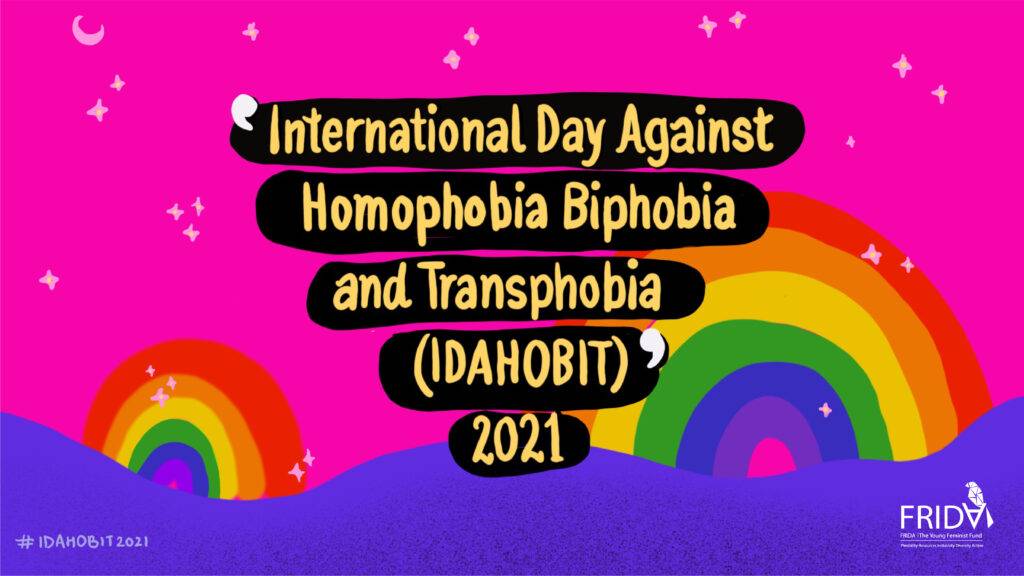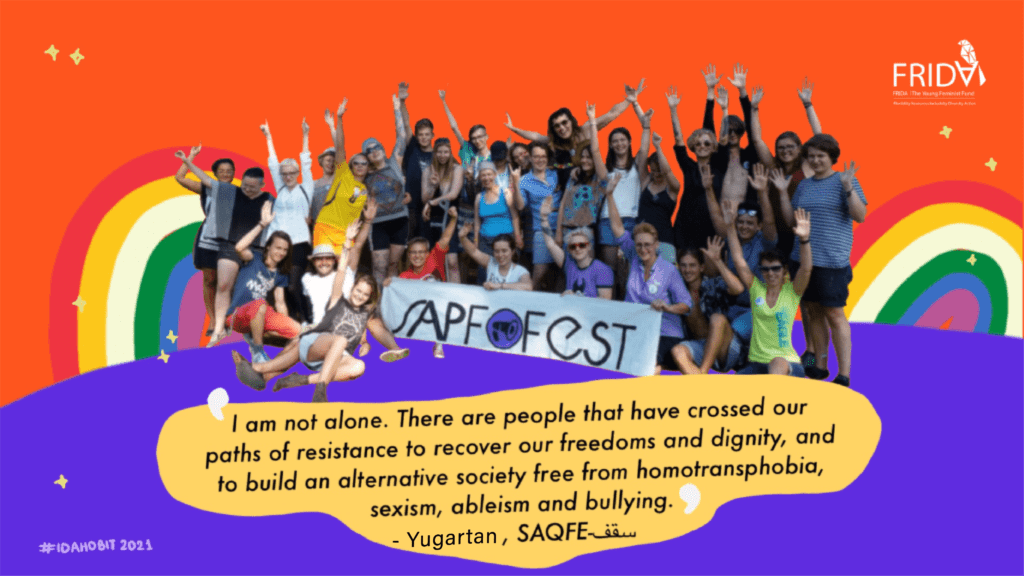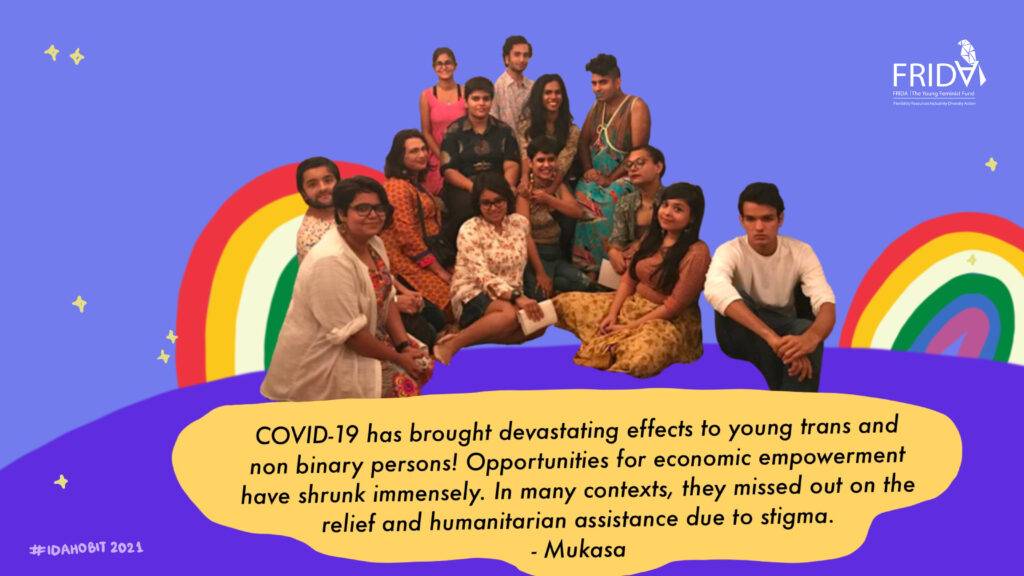A roundtable dialogue–in two parts–among movement actors and philanthropists on LGBTQIA+ organizing, what philanthropy needs to do more and how we can mobilise together to rise above hate and continue building transnational solidarities.

This May 17, on International Day Against Homophobia, Biphobia and Transphobia, we call out the prejudice and discriminaion faced by LGBTQIA+ individuals in their daily lives and celebrate sexual and gender diversities. The queer community has, essentially, taught us to question the binary way of looking at things re-emphaisizing that humans are beautifully complex people and these differences make us who we are. There lies strength in this diversity and May 17 is a good reminder to value it daily and condemn transphobic, biphobic and homophobic attitudes that we are, unfortunately, so familiar with.
As COVID-19 deepens the vulnerabilities affecting LGBTQIA+ lives and the rise of conservative governments around the world perpetuate persecution and violence, FRIDA | The Young Feminist Fund makes space for a collective reflection led by the diverse voices that are part of our ecosystem. As a donor supporting young activists doing intersectional work, we want to promote dialogue and understanding about challenges faced by those fighting homophobia, transphobia and biphobia, and offer grantmakers learnings on how to better support them while also having conversations around diversity and inclusion. We invited members of FRIDA community and peer grantmaking organizations for a roundtable, where they engaged in answering some key prompts to help inspire these reflections.
A note on participating interviewees:
- Di (D) is a queer feminist activist and researcher, who has been associated with organizing around LGBTQIA+ rights at the grassroots level.
- Tiffany Mugo (T) runs the sex positive platform HOLAAfrica! which looks at a things sex and sexuality within the African continent and beyond. She is a current board member at FRIDA.
- Yugartan (Y) is part of SAQFE-سقف , a FRIDA grantee partner from the MENA region that works at the intersection between art and activism to elevate LGBTQIA+ voices and concerns.
- Mukasa (M) is a Senior Program Officer at International Trans Fund, a participatory grantmaking fund made up of trans activists and donors.
- Neish McLean (N) is Programs Consultant for the Caribbean region at Astraea Lesbian Foundation for Justice, the only philanthropic organization working exclusively to advance LGBTQIA+ human rights around the globe.
- Letícia Vieira da Silva (L) is a young feminist, LGBTQIA+, and antiracist activist from Brazil. She is also the Communities & Culture Officer at FRIDA.
The responses are presented in two parts. Part 1, below, tries to understand the specific challenges faced by LGBTQIA+ people and how COVID-19 has impacted the organizing they do. In Part 2 [to be released soon!], we will share further reflections on what philanthropy and donors need to do better in order to support and sustain movement building led by LGBTQIA+ people. Watch this space!
Why is it especially important to speak up against phobia and discrimination faced by young LGBTQIA+ people? How do you think young people experience this prejudice differently?
D: I am a young, bisexual woman, a feminist activist and a queer immigrant. All these identities as well as the communities that they led me towards have guided the growth of my politics. Standing at this particular intersection, I simply don’t believe in a feminist world that excludes queer people, trans people and nonbinary people.
I have often heard from young queer organizers about their experiences of phobia and discrimination aggravated by the fact that they are young. In a survey that I was part of, two Asia-based collectives working on transgender rights and intersex rights shared that their biggest threats are transphobia and intersexphobia from their local LGBQ communities. We know it is particularly painful when it comes from queer communities we hold dearly. When younger and newer activists and organizers encounter such practices, they are more likely to feel isolated. There are many things to unlearn within our own movement spaces. We need to hold each other accountable at all times and the IDAHOBIT is a day of reminder, a day of collective reflection and learning.
Y:
اتذكر عندما خرجت انا وصديقتي، كنت في سن المراهقه في لقاء تعارفي بين أفراد الكوميطا* كان منظم بمقهى بالمدينة التي كنت أقطن فيها، عند وصولي للمكان الحدث، شعرت بالإنتماء الذي كنت أفتقر له بين أصدقائي سيس هيتيرونورماتيف، تخلصت من الخوف الذي كان بداخلي بسبب ميولي و تعابيري و هويتي، أن تعيش.ي كلاثنائي.ة بشمال إفريقيا و تتعاملين مع فكر و نظام هيتيروسيسنورماتيف لا يقبل الإختلاف جعل ذلك مني أرفض هذا التسلط طاغي الذي يأخذ مني إختياري في التحكم بجسدي، كلامي و أسلوبي. ترجم هذا الرفض في البداية للفعل عبر البحث، اللقاءات و تبادل المعارف و التجارب بين الكوميطا. أنا لست وحيد.ة فهنالك أفراد تقاطعت طرقنا في المقاومة من أجل إسترجاع حرياتنا و كرامتنا و بناء مجتمع بديل خال من الهوموتراسفوبيا, سيكسيزم، ابلييزم و التسلط.
هويتي ليست مفروضة، و لا أريد أن تفرض عليك.ي هوية التي لم تختاريها، أنا لا ثنائي.ة مثلي.ة، بجسد يعتبره المجتمع جسد رجل، أنا مرفوض.ة غير موجود.ة للمجتمع، ظهوري و وضوحي يجعلني مني هدف للتفريغ شحنة سامة من نظام كان ضحيته مجتمع.
و مع ذلك نجحت و فزت ببناءي و أنا فرح.ة بنموي في مسار إخترته.
[I remember once when I went out with my friend, I was a teenager and there was a meeting in the community. It was organised in the city that I was living in. When I arrived at the event, I felt the belonging which I was missing when I was with my cis and hetronormative friends. I got rid of the fear that was within me because of my gender expression. Living as non binary in North Africa and dealing with a heteronormative system, that doesn’t accept difference, made me reject this tyrannical oppression which has taken my choice from me in controlling my body, my words and my style. This refusal was translated into researching, meeting, and exchanging knowledge and experiences within the community. I am not alone. There are people that have crossed our paths of resistance to recover our freedoms and dignity, and to build an alternative society free from homotransphobia, sexism, ableism and bullying.
My identity is not imposed, and I don’t want to be imposed on you. I am a non-binary gay, with a body that society considers the body of a man. I am rejected and non-existent in the society. My appearance and my confidence make me a target to unload toxicity in a system in which I am a victim. Nevertheless, I have succeeded and I’ve built myself. I am happy with my growth on a path that I have chosen.]

T: The fact that young queer and trans folks often do not have the financial freedom of older queer folx makes them especially vulnerable. When one experiences homophobia in settings such as the school or home, for example, it is a lot harder to simply shake it off or move around it because they are super dependent on these institutions and spaces. This is also compounded by the fact that being young is a confusing time, full of self doubt, changing body types, trying to figure out the rest of your life and other rites of passage. This period of life is already hard enough without having to navigate issues around your sexuality. Folx can be especially cruel during this time, kids can be mean and there isn’t really much recourse for younger people to deal with this cruelty. This coupled with being at the mercy of adults can make things all the more difficult. Even as one grows older and enters the workplace as a young person there are still legions of older people to deal with and the power dynamics that come with that.
M: Young trans people are one of the most marginalized groups in society facing heightened levels of stigma and discrimination in their daily lives. Trans youth especially struggle in accessing education, employment and livelihood opportunities.
L: Young people who do not conform to sexual norms are more vulnerable to experiencing violence from within their own family. Such oppressions can manifest in symbolic and physical ways and are supported by historically hierarchical power structures that place heterosexuality as a norm, imprint a “naturalness” to cisgenerity, and impose a lower value to the lives of those who do not conform to cishet standards. Young LGBTQIA+ people tend to find themselves without family and psychological support, and such violence can also be reproduced in the school environment. Formal education institutions tend to reproduce conservative values and gender norms.
D: Every now and then, there are rumors floating around that queer, trans and nonbinary people are “spreading” the COVID-19 virus. This has shown how phobia and discrimination are deeply rooted in many communities against people who are not conforming to gender and/or sexual norms. In addition, there are consistent reports about family and domestic violence faced by LGBTQIA+ people during the quarantine period that has forced folx to stay with their families of origin.

What specific challenges did COVID-19 bring for young people facing homophobia, transphobia and biphobia?
D: Every now and then, there are rumors floating around that queer, trans and nonbinary people are “spreading” the COVID-19 virus. This has shown how phobia and discrimination are deeply rooted in many communities against people who are not conforming to gender and/or sexual norms. In addition, there are consistent reports about family and domestic violence faced by LGBTQIA+ people during the quarantine period that has forced folx to stay with their families of origin.
Y:
فترة الحجر الصحي لم تكن سهلة على الكوميطا* و على نفسي،تضاعفت الهوموترانسفوبيا بشدة خصوصا بالنسبة للأفراد الذين ليس لديهم الخيار سوا العيش في وسط هوموفوبي، كذلك مع حملات التشهير و الكراهية ضذ مثليين.ات عن طريق وسائل التواصل الإجتماعي التي أذت لإنتحار فرد من الكوميطا* و فقدان المسكن للعديد، نتج عن هاته الأحداث تأزم أوضاع الكويرز، الترانس، المثليات.ين بمنطقتي. كانت العزلة ملاذي الوحيد و العالم الرقمي هو بديلي للتعارف والإرتحال،.
[The quarantine period was not easy for the community and for myself. Homophobia and transphobia have multiplied greatly, especially for individuals who have no choice but to live in a phobic environment. Bullying and outing campaigns against gay people led to the suicide and the loss of housing for many. These events have worsened the situation for gays, trans people and queers in my region. Solitude was my only refuge, and the digital world was my alternative for meeting people and for travelling.]
T: COVID cut people’s paper. In other words, the security and autonomy provided by financial independence meant that some queer and trans folx were made extremely vulnerable, having to return to abusive and violent spaces that they had worked so hard to escape. Furthermore the closing down of schools, offices and other queer friendly spaces meant that some young people were forced to return to lives which boxed them in and spend months and months confided in these spaces. Many queer and trans youth organisations and collectives have ‘gone digital’ adding to the sense of isolation that everyone is already feeling.
M: COVID-19 has brought devastating effects to young trans and non binary persons! Opportunities for economic empowerment have shrunk immensely! To make matters worse, trans youth have been unable to access gender affirming health care during lockdown and are now struggling to refresh the vigorous efforts historically made to evolve the health systems and practices to be more inclusive. Actually, in many contexts, trans and non binary persons missed out on the relief and humanitarian assistance due to stigma.
L: In Brazil, unemployment and precarious work conditions met a historical absence of public policies dedicated to promoting education. The pandemic deepened the already smaller access of LGBTQIA+ young folx to formal jobs, in comparisson to cisgender and heterosexual people. It starts from the higher rates of school evasion and goes to the bigger number of unemployed people. In addition, there is an increase in domestic violence cases.
If we talk about sex workers and the hypocrisy with which their rights and agenda are treated by society and governments, we realise they have no governmental support to face this global situation. They are facing additional hardships in accessing limited resources, either because of the difficulty to access the internet or because of violent and bureaucratic obstacles linked to the non-recognition of their gender identity by the state, in the case of transgender people.
We are thankful to the interviewees for sharing their insights and perspectives for this article.